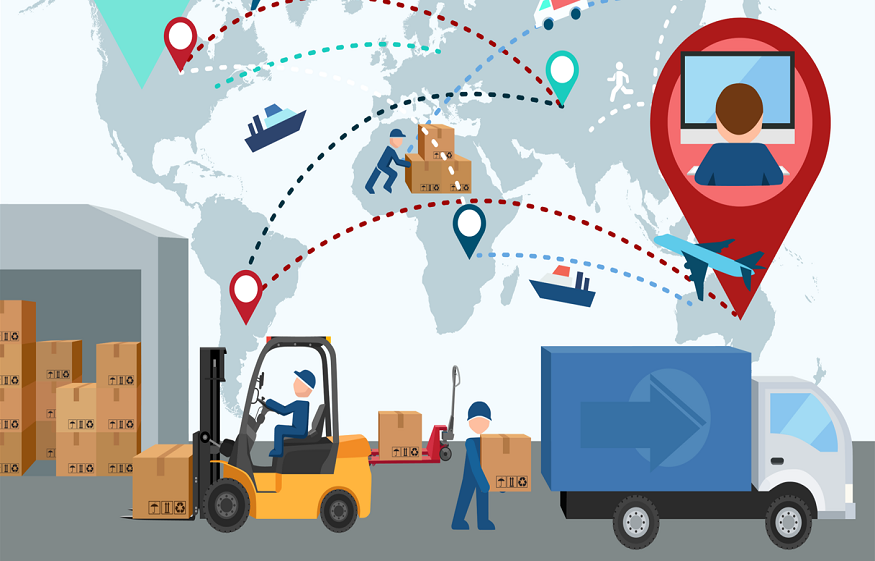8 Key Considerations for Choosing Logistics Software

In the world of logistics, choosing the right software is critical to the success of your operations. With the right logistics software, you can manage your inventory, order fulfillment, and warehouse operations more efficiently, reducing your costs and improving your customer service. However, with so many options available, it can be challenging to choose the best software for your needs. Here are nine key considerations to keep in mind when choosing logistics software for your freight forwarding business.
Logistics is an essential part of any business that deals with the movement of goods. Effective logistics management ensures that goods are transported efficiently, costs are minimized, and customers receive their orders in a timely manner. One of the key factors that contribute to efficient logistics management is the use of logistics software.
Logistics software, also known as freight forwarding software, is designed to help businesses manage their supply chain operations more efficiently. With the help of logistics software, businesses can streamline their logistics operations, optimize their routes, and reduce delivery times. Moreover, logistics software can help businesses to automate various tasks, such as inventory management, billing, and document management, which can save time and reduce the risk of errors.
The use of logistics software has become increasingly important in today’s business world due to the complexity of supply chain operations. The software provides real-time visibility of shipments, enabling businesses to track their shipments from origin to destination. This level of visibility not only helps businesses to identify potential problems but also enables them to respond proactively to any issues that may arise. Additionally, logistics software can help businesses to analyze their logistics data and provide insights into their operations, which can lead to improved decision-making and increased efficiency.
Choosing the right logistics software is crucial for any business that relies on supply chain operations. With so many logistics software solutions available in the market, it can be challenging to determine which one is the best fit for your business. This is why it’s important to consider certain factors before making a decision. In this blog post, we will discuss 8 key considerations that businesses should keep in mind when choosing logistics software. These considerations include scalability, flexibility, integration, usability, customer service, cost, security, support, and functionality. By evaluating these factors, businesses can choose the best logistics software solution for their operations.
1- Scalability
It refers to the ability of a logistics solution to handle an increase in demand or volume without the need for major changes or disruptions to the system. The importance of scalability lies in the fact that businesses need a logistics solution that can grow with them as their operations expand.
Freight forwarding software can help businesses achieve scalability in their logistics operations. The software provides real-time visibility of shipments, enabling businesses to track their shipments from origin to destination. It also automates various tasks such as inventory management, document management, and billing, which can save time and reduce the risk of errors. By leveraging these features, businesses can manage their logistics operations more efficiently and handle an increase in demand without the need for major changes to their system.
Online freight solutions are another example of logistics software that can be scaled to meet the needs of businesses. These solutions are hosted in the cloud, which means that businesses can easily scale up or down their logistics operations as needed. With online freight solutions, businesses can easily add or remove carriers, track their shipments, and manage their documents from a single platform. This level of scalability provides businesses with the flexibility they need to adapt to changing market conditions and grow their operations without significant disruptions.
2- Flexibility
Flexibility enables businesses to adapt to changing market conditions and customer needs. With the increasing complexity of supply chain operations, businesses need logistics solutions that can be customized to meet their specific requirements. Flexibility allows businesses to tailor their logistics operations to their unique needs, enabling them to achieve greater efficiency and competitiveness.
Freight management solutions can provide flexibility by offering a range of features that can be customized to meet the specific needs of a business. For example, businesses can choose from a variety of transportation modes, carriers, and routes, enabling them to select the best options for their specific needs. These solutions can also be customized to include additional features such as real-time tracking, inventory management, and billing. By choosing the right freight management solution, businesses can ensure that their logistics operations are tailored to their unique needs.
Online freight solutions are another example of logistics software that can be customized to provide flexibility to businesses. These solutions are hosted in the cloud, which means that businesses can easily access their logistics data from anywhere in the world. Moreover, online freight solutions can be customized to meet the specific needs of a business, including the ability to integrate with other systems, such as accounting or inventory management software. With online freight solutions, businesses can easily add or remove carriers, track their shipments, and manage their documents from a single platform. This level of flexibility enables businesses to adapt to changing market conditions and customer needs, and ultimately, to stay ahead of the competition.
3- Integration
The ability to integrate with other systems enables businesses to streamline their operations and achieve greater efficiency. In today’s fast-paced business environment, businesses need logistics software that can work seamlessly with other systems to ensure smooth operations.
Freight forwarding software can integrate with other systems such as accounting or inventory management software, providing a comprehensive logistics solution. By integrating with other systems, businesses can automate various tasks such as invoicing, payments, and order processing, which can save time and reduce the risk of errors. This level of integration enables businesses to manage their logistics operations more efficiently and effectively.
Online freight solutions are another example of logistics software that can be integrated with other systems to provide a comprehensive logistics solution. These solutions can be customized to integrate with a range of systems, including warehouse management systems and transportation management systems. By integrating with these systems, businesses can track their shipments in real-time and optimize their logistics operations. Additionally, online freight solutions can be integrated with eCommerce platforms, enabling businesses to manage their online orders and shipments from a single platform.
4- Functionality
Businesses need software that can effectively manage their freight forwarding operations. It is essential to choose software that can provide a comprehensive logistics solution that includes features like shipment tracking, automated documentation, and real-time reporting. These features can help businesses manage their operations more efficiently and improve customer satisfaction.
Shipment tracking is an essential feature of logistics software. It allows businesses to track their shipments in real-time and provides visibility into the shipment status. This feature can help businesses identify potential problems before they become major issues, enabling them to respond proactively and minimize disruptions. Moreover, shipment tracking can help businesses provide more accurate delivery estimates to customers, improving customer satisfaction.
Automated documentation is another critical feature of logistics software. It can help businesses manage their documentation more efficiently, reducing the risk of errors and improving compliance with international regulations. Automated documentation can also save time, enabling businesses to focus on other aspects of their operations.
Real-time reporting is another important feature of logistics software. It provides businesses with insights into their logistics operations, enabling them to make more informed decisions about their operations. Real-time reporting can help businesses identify potential cost savings, optimize their routes, and reduce delivery times. Additionally, it can help businesses identify trends and patterns in their logistics data, enabling them to make more informed decisions about their logistics operations.
5- Cloud-Based vs. On-Premise
When choosing freight forwarding software, businesses need to consider whether they want to use cloud-based or on-premise software. Cloud-based software, also known as software-as-a-service (SaaS), is becoming increasingly popular due to its flexibility and scalability. With SaaS freight forwarding software, businesses can access their data and manage their operations from anywhere with an internet connection. This level of flexibility enables businesses to adapt to changing market conditions and customer needs, and ultimately, to stay ahead of the competition.
In addition to flexibility, cloud-based software also offers scalability. Businesses can easily scale up or down their operations as needed, without the need for major changes or disruptions to the system. Moreover, with cloud-based software, businesses can reduce the need for additional resources to manage the software, as updates and maintenance are handled by the software provider.
On-premise software, on the other hand, is installed on local servers and can be more secure but may require additional resources to manage. While on-premise software can offer greater control and security over data, it can also be more costly to maintain and update. Additionally, it may not offer the same level of flexibility and scalability as cloud-based software.
6- Cost
Cost is an important consideration when choosing freight forwarder software. However, it’s essential to balance cost with functionality and features. While cheaper software may save businesses money in the short term, it may not provide the features and scalability needed as the business grows. It’s important to choose software that provides value for money and offers the features needed to manage freight forwarding operations effectively.
When evaluating the cost of freight forwarding software, businesses should consider not only the upfront cost but also the total cost of ownership. This includes ongoing costs such as maintenance, upgrades, and support. Moreover, businesses should consider the potential return on investment (ROI) of the software. Will the software help reduce costs, improve efficiency, or increase customer satisfaction? These factors should be taken into account when evaluating the cost of freight forwarding software.
7- Customer Support
You need to consider not only the features and functionality but also the level of customer support provided by the vendor. Even with the most user-friendly software, there may be times when businesses need assistance or guidance. Look for a vendor that provides excellent customer service, with a dedicated support team available to help with any issues or questions that may arise. This is particularly important when managing time-sensitive shipments, where any delays or disruptions can have a significant impact on the business.
The level of customer support provided by the vendor can also impact the adoption and use of the software within the organization. If employees have access to reliable and responsive customer support, they may be more likely to use the software effectively, leading to improved efficiency and productivity. Moreover, a vendor that provides excellent customer support can help businesses stay ahead of the competition by providing superior services to their customers.
8- Security
In addition to technical security measures, the software vendor should also have policies and procedures in place to protect your data. Make sure they have a clear data protection policy that covers all aspects of data handling, including data access, data storage, and data retention. This policy should also outline the vendor’s responsibilities in the event of a data breach.
It’s also worth considering where your data will be stored. Some software vendors store data in the cloud, while others store it on local servers. Both options have their pros and cons, but ultimately it comes down to your organization’s preference and regulatory requirements. Regardless of where your data is stored, make sure it’s backed up regularly and that there are disaster recovery procedures in place in case of a catastrophic event.
Final thoughts
When it comes to freight forwarding software, security is not something to take lightly. By doing your due diligence and choosing a vendor that takes data security seriously, you can have peace of mind knowing that your data is safe and secure. With the right software in place, you can streamline your operations, reduce costs, and focus on growing your business.
In conclusion, choosing the right logistics software is a critical decision for businesses. There are eight key considerations to keep in mind when evaluating different options, including functionality, security, scalability, integration, cost, technology, customer support, and flexibility.
To choose the best logistics software for your business, it’s important to balance these considerations and evaluate each option based on your specific needs and requirements. Consider the features you need to manage your freight forwarding operations effectively, the level of customer support provided by the vendor, and the potential ROI of the software.
At the end of the day, logistics software is essential for businesses that want to stay ahead of the competition and provide superior services to their customers. With the right logistics software, businesses can manage their operations more efficiently, reduce costs, and improve customer satisfaction. By carefully evaluating your options and choosing the right logistics software for your business, you can achieve greater efficiency, productivity, and success in today’s fast-paced business environment.
Logitude World provides freight forwarders with advanced freight forwarding software to manage all operations on one digital platform and deliver superior freight forwarding services.
LinkedIn: https://www.linkedin.com/company/logitudeworld/






